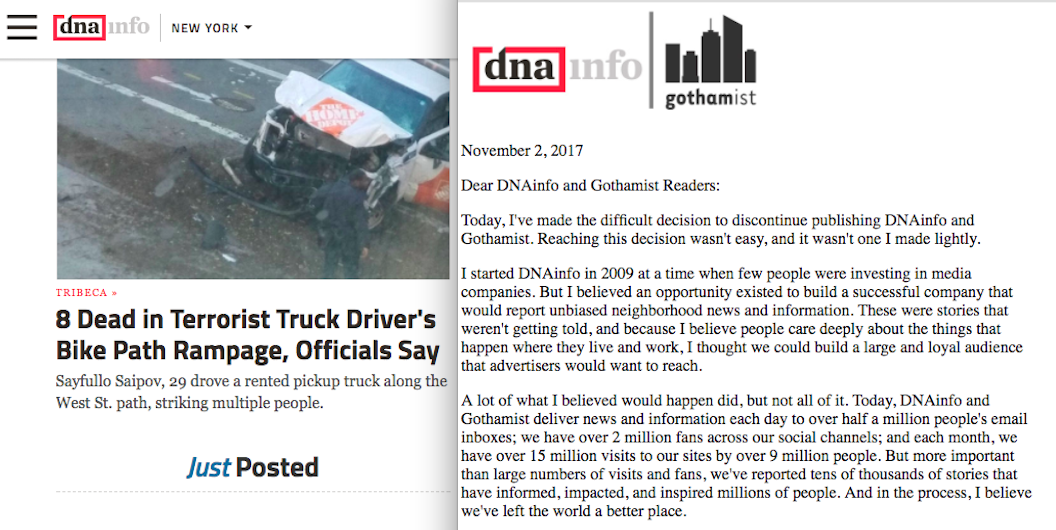
What billionaires giveth, billionaires can taketh away.
DNAinfo and Gothamist, two popular local news networks, were abruptly shutdown last night, just a week after employees of companies voted to unionize. Billionaire Joe Ricketts, who launched DNAInfo in 2009 and acquired Gothamist last year, wrote that while the two sites had accomplished much over the years (9 million unique visits a day) “that progress hasn’t been sufficient to support the tremendous effort and expense needed to produce the type of journalism on which the company was founded.” Of course the timing of the news lent itself to a different conclusion: rather than recognize the sites’ unionization efforts, Ricketts (who hasn’t kept secrets his distaste for unions) decided to shut them down. Adding insult to injury, the dozens DNAinfo and Gothamist employees (which included both writers and salespeople) were themselves blindsided by the news, which many learned of via the message that all the sites’ links redirected to.
Gothamist, LAist, DCist, Chicagoist, SFist, Shanghaiist, DNA Info have all shut down
— Jon Passantino (@passantino) November 2, 2017
Here are some early takeaways.
— Perhaps billionaires aren’t the ideal benefactors for news. The success of Jeff Bezos-backed Washington Post and Pierre Omidyar’s First Look Media have been encouraging signs that, news organizations can thrive and do good work under a billionaire aligned with their efforts. Joe Ricketts offers a counterargument. Signs that Ricketts didn’t hold journalistic independence sacrosanct came soon after DNAinfo acquired Gothamist LLC, which promptly deleted at least five stories since 2010 about its new owner.
Gothamist’s publishers deleted negative coverage of Ricketts before selling to him, now he’s wiped the whole archive https://t.co/oILUKW35zE
— Brendan O’Connor (@_grendan) November 2, 2017
A billionaire had his feelings hurt, so Gawker is dead. A billionaire’s workers asserted their personhood, so Gothamist/DNA Info is dead.
— Judy Berman (@judyberman) November 2, 2017
Journalism isn’t a hobby for rich people to experiment with and then abandon when it becomes inconvenient for them https://t.co/z3HH8llPWC
— Caro (@socarolinesays) November 2, 2017
Doesn’t matter how benevolent your billionaire is (& this one wasn’t), Part 1,000,000,000: https://t.co/70Kctk7Rsb pic.twitter.com/KjKcKQYye6
— William Brennan (@wm_brennan) November 2, 2017
— Archive, archive, archive. While The Times has confirmed that there are efforts underway at DNAinfo to archive the sites, there are already multiple external underway as well. Developers @xn9q8h and @turtlekiosk wrote The Gothamist Archive Retrieval Tool, which Gothamist and DNAinfo writers can use to recover their clips from the Google AMP caches of the two sites. Paul Ford created a spreadsheet that links to over 50,000 deleted articles, though it only works with Gothamist.com at the moment. And then there’s the The Internet Archive’s Wayback Machine, which has also been a valuable resource for writers. Erin Kissane at OpenNews has the most complete collection of the archiving efforts.
UPDATED! Archiving this work is much easier today than it was yesterday, thanks to the people speed-building tools https://t.co/11UAxuBq6g
— Erin Kissane (@kissane) November 3, 2017
I’ve been plugging people’s names into the AMP scraper tool. Results of that scraping seem pretty clean: https://t.co/ztf8joMYNS
— Peter Sterne (@petersterne) November 3, 2017
it also means all the hard work we did toward accountability is erased. nine years of this city’s history, gone.
— Danielle Tcholakian (@danielleiat) November 2, 2017
If you need faith in humanity, look at those who help when it doesn’t benefit them. This is great.https://t.co/mv34CIyDbZ#Gothamist
— Brad Siefert (@bksiefert) November 3, 2017
Another black eye for local news. While the early reaction to the news has rightfully focused on how it will affect the dozens of people who find themselves suddenly unemployed, it’s worth remembering that many people in local communities (and, yes, big media rich cities like New York and San Francisco) relied on the sites for local news. It’s been a rough 24 hours for them as well.
Deeply disappointed at the decision to shut down DNAinfo and Chicagoist, which provided valuable reporting for Chicago’s neighborhoods.
— Mayor Rahm Emanuel (@ChicagosMayor) November 3, 2017
In an homage to the late, great @DNAinfoCHI, we compiled 10 of their best headlines this year. https://t.co/VTQ6DiOTLl
— Chicago magazine (@ChicagoMag) November 3, 2017
The loss of these beloved local news sites hurts journalists, but beyond that, it hurts communities. https://t.co/IiTjGPjMaW
— Brian Stelter (@brianstelter) November 2, 2017
DNAinfo broke quite a few stories about police brutality. Not only shutting them down, but wiping their archive, is a political act.
— Vann R. Newkirk II (@fivefifths) November 2, 2017
Local media is a utility like water, and its running collapse is a pressing local policy problem https://t.co/FgUI9oXMMe
— Ben Smith (@BuzzFeedBen) November 2, 2017